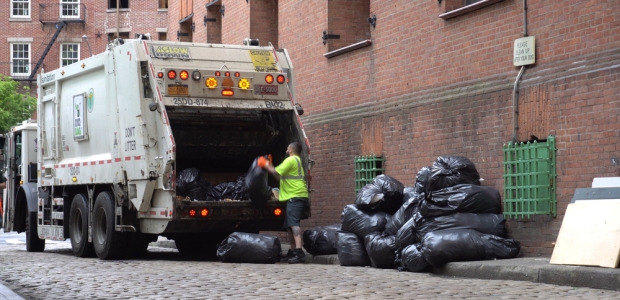
NYC Working to Overhaul Commercial Waste Collection
The city's private garbage hauling industry has become inefficient in its operation and unsafe. The Commercial Waste Zones plan will eliminate 18 million miles of truck traffic every year, a 63 percent reduction from today, according to Arcadis, the company that completed the plan for New York City's Department of Sanitation.
New York City's Department of Sanitation has begun accepting public comments on a sweeping plan to overhaul the city's private garbage hauling industry, which has become both inefficient in its operation and unsafe. The commercial Waste Zones plan will eliminate 18 million miles of truck traffic every year, a 63 percent reduction from today, according to Arcadis, the company that completed the plan for the department. The department held a public forum Dec. 11 to receive comments on the Draft Scope and will accept written comments on the Draft Scope until Dec. 21 on it.
The plan would divide the city into 20 zones, each served by three to five haulers selected through a competitive process. A hauler will work only within its zone, which will reduce truck traffic and strengthen service standards while still allowing for customer choice, said Peter Glus, senior vice president for Arcadis, a Dutch company. "Currently, more than 90 different private carters drive overlapping routes throughout the city each night," said Glus. "They drive long, inefficient, and unsafe routes, which leads to excessive traffic, noise, pollution, and diminished quality of life for New Yorkers. The plan will address many of those problems and help propel the city toward a more resilient and sustainable future."
Working under an $8 million contract, the Arcadis-led team developed the plan based on more than a year of analysis of existing operations in the commercial waste sector. The team analyzed routing and customer data provided by Business Integrity Commission-licensed haulers for four weeks spread over a one-year period. The analysis showed that one block may see trucks passing through up to 400 times in a single day. Routes are largely based on customer preferences, and one route may have as many as 1,000 stops over 100 miles. In some areas, more than 50 trucks serve a single neighborhood.
"We're excited to have taken part in this critical effort to overhaul of New York's private waste industry," said Glus. "Successful implementation will remove about 18 million miles of truck traffic every year - a 63 percent reduction from today."
The plan will require haulers to provide recycling and organics collection to every refuse customer and demonstrate proper disposal of materials, require them to submit a zero-waste plan and offer recycling and organics collection at a discounted rate, and require them to provide transparent pricing that incentivizes cost control and allows customers to negotiate. It also will require haulers to submit collective bargaining agreements and comply with labor laws.
Now that the plan is opened to public input, the city must conduct an environmental review and work with the City Council on legislation before soliciting proposals. Arcadis reports that, once contracts are awarded, customer transitions will likely begin by the end of 2021, with the new system fully in place by 2023.
The department released the plan Nov. 7, days after the NYPD, working with the Business Integrity Commission, began a major enforcement effort, the Dusk and Darkness campaign, against the hauling industry, which has been involved in dozens of fatalities in recent years and yielded more than 500 moving violations in one week. The plan and appendices are available at nyc.gov/commercialwaste.
"The city's current commercial waste carting system has proven itself to be inefficient, unsafe, and unsustainable,” said Sanitation Commissioner Kathryn Garcia. "The Commercial Waste Zones plan is a comprehensive blueprint to create a safe and efficient collection system for commercial waste that provides high-quality, low-cost service while advancing our zero waste goals. It is a plan that will lead to a fairer, safer, more sustainable New York City."